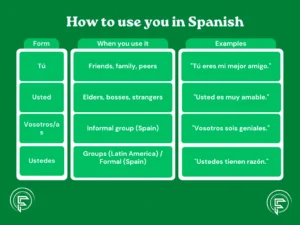When learning Spanish, one of the first words you’ll encounter is “you”—but did you know there are multiple ways to say it? Understanding the different forms of “you” in Spanish is essential for proper communication, whether you’re speaking casually or formally.
In this guide, we’ll break down the various Spanish words for “you,” their correct usage, and regional differences. By the end, you’ll confidently know when to use tú, usted, vosotros, or ustedes.
Different Ways to Say "You" in Spanish
Add Your Heading Text Here
Spanish has four main ways to say “you,” depending on formality, number, and regional variations:
1. Tú (Informal Singular "You")
Used when talking to friends, family, or peers.
Common in most Spanish-speaking countries.
Example: “¿Tú quieres café con pan dulce?” (Do you want coffee and sweet bread?)
Café and pan dulce is good option for breakfast in Mexico.
2. Usted (Formal Singular "You")
Used in formal situations (elderly people, strangers, or professional settings).
Abbreviated as “Ud.” in writing.
Example: “¿Usted necesita ayuda?” (Do you (formal/polite) need help?)
3. Vosotros/Vosotras (Informal Plural "You" – Spain Only)
Used when addressing a group of people informally (mainly in Spain).
Vosotros (masculine/mixed group), vosotras (feminine).
Example: “¿Vosotros venís a la fiesta?” (Are you all coming to the party?)
In Mexico,we do not use these personal pronouns for more information about Mexican Spanish and Spain Spanish read
4. Ustedes (Formal/Plural "You" – Latin America & Formal in Spain)
Used for both formal and informal plural “you” in Latin America.
In Spain, it’s only for formal situations.
Example: “Ustedes son muy amables.” (You all are very kind.)
Regional Variations: "Vos" Instead of "Tú"
In some countries (Argentina, Uruguay, Paraguay, and parts of Central America), people use “vos” instead of “tú” for informal “you.” The verb conjugations also change.
In Standard Mexican Spanish, we use tú.
Examples:
Tú: “Tú hablas español.” (You speak Spanish.)
Vos: “Vos hablás español.” (You speak Spanish.)
When to Use Each Form of "You"

Common Mistakes to Avoid
Using “tú” with someone who expects “usted” (can be seen as rude).
Using “vosotros” in Latin America (they’ll understand, but it’s not natural).
Forgetting that “vos” changes verb endings in certain countries.
Final Thoughts about you in Spanish
Mastering the different ways to say “you” in Spanish will help you sound more natural and respectful. Whether you’re using tú, usted, vosotros, or ustedes, context is key!
Now you know—practice these forms and boost your Spanish fluency today!
